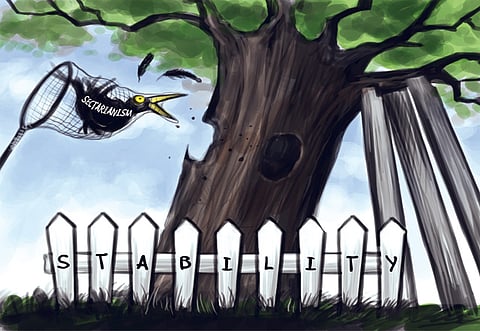Good governance can make all the difference
Resolving the intense power struggle within Iraq is the key to long-term stability

No, we Iraqis did not welcome US invaders with flowers and coloured balloons.However, we did offer them tea and bread, and sometimes showered them with wahliyah (an Iraqi term for small pieces of wrapped candy and toffee) as people in Iraq usually do during weddings and festivities.
Only a hypocrite today will tell you that most Iraqis did not want to get rid of the Baath regime that ruled the country with an iron fist for 35 years.
The only true description of those days was depicted in Kanan Makiya's book Republic of Fear, because fear was what we breathed and tasted every day during the 35 years we were ruled by the Baathists in Iraq.
Today, Iraqis are still paying through the nose for all the atrocities of the former regime.
Eight years of our lives were wasted in a war against Iran and as a result, the Algeria pact — which the regime fought against and which saw the loss of more than one million lives on both sides — was restored.
Less than two years later, Saddam Hussain invaded Kuwait, shaming and distressing Iraqis. Saddam stepped over the very pledge he had made in 1980, that no Arab country will ever invade another Arab country. Only ten years later, we were barely licking our wounds on that August 1990 morning when the radios blared out the news.
Beginning of the end
However, a very wise political analyst whispered that day to his friends that this was the beginning of the end for Saddam's regime.
When former US president George W. Bush announced his ultimatum around September 2002, Iraqis were secretly congratulating each other with tears of joy.
Little did the Iraqis know then that the US was going to invade Iraq without a solid "day-after" plan.
The outcome was a miserable failure.
We can separate post-2003 Iraq into two phases: the phase before General David Petraeus and the phase after he took over.
General Petraeus was a part of the first step of the invasion where he commanded the 101st Airborne Division and later was in charge of Mosul, where his way of dealing with issues won him the name King David from staunch Arab nationalists of the governorate, who hated the invasion as much as they respected and were fond of Petraeus.
The very first mis-step that was taken by the Bush administration at the time and opposed by many US generals — including Petraeus — was dismantling the Iraqi army.
In the words of Petraeus himself, that day marked the beginning of the insurgency in Iraq.
General Petraeus soon left Iraq for the US and from 2005 until 2007, Iraq was on the verge of civil war.
The smartest and maybe the only brilliant move by Bush was choosing Petraeus directly out of the US army chain of command and sending him back to Iraq as the Commander of the Multi National Forces.
As Foreign Policy magazine noted, General Petraeus oversaw the creation of a new counter-insurgency field manual for the US military. Its release marked a definitive break from a losing strategy in Iraq and reflected a creeping realisation in Washington: To avoid repeating the mistakes of the Vietnam War, the US military would have to re-learn and institutionalise key lessons from that conflict. The basic tenets of that doctrine are simple: Focus on protecting civilians over killing the enemy. Assume greater risk. Use minimum, not maximum force.
And it worked.
However, the political process in Iraq did not do as well.
In his report to Congress on the situation in Iraq, dated April 8-9, 2008, General Petraeus described the fundamental nature of conflict among Iraqis and the political process as a whole by saying that it resembled a competition among ethnic and sectarian communities for power and resources.
This competition continues, influenced heavily by outside actors, and its resolution remains the key to producing long-term stability.
Those few words sum up the problem in Iraq today.
The failure of all three Iraqi governments that took over responsibility after 2003 stems from corruption and competition for power.
Most of the key officials in the former government were refugees who lived in Syria, Iran, the US and Europe.
One would imagine that after all the hardship and difficulties they suffered in their "diaspora" days, that they would be good leaders. Instead, Iraq has become the fifth most corrupt country in the world.
A new government will soon be in office. The problem is that sooner or later, the sectarian quota issue will surface because the government will be made of secular forces, mixed with a huge presence of sectarian forces.
The basis of the government structure needs to be revised and as long as Iraq is being modelled on "democratic" lines, why not take it a step further and allow only the two strongest groups to compete?
It is only then that Iraqis will learn how to abide by the law and not twist the law according to the interests of the different components of a government that will only be a replica of Nouri Al Maliki's former government.


